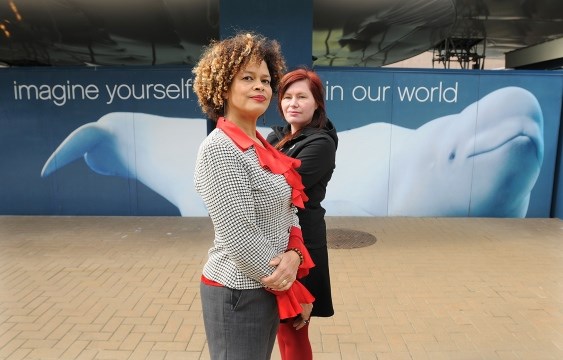In an unprecedented move, two Vision Vancouver park board commissioners are stating publicly they want all cetaceans — whales and dolphins — phased out at the Vancouver Aquarium. Not coincidently, the city’s bylaw surrounding the keeping of cetaceans in captivity is up for review next year. Vision commissioner Sarah Blyth says it was her decision not to seek a third term on the park board that gave her the inspiration to speak out.
“No one doubts the aquarium does amazing conservation work,” Blyth said. “But everyone I talk to asks about the whales and dolphins.”
In 2010, a motion by Green Party commissioner Stuart Mackinnon recommending a non-binding plebiscite on keeping captive cetaceans was voted down by Vision Vancouver commissioners, with the exception of Constance Barnes, who now sits as Vision’s vice-chair of the park board.
But, Blyth notes, the increased push to include a referendum in the November election could be ill-timed.
“I’d like to see the question asked, ‘Should whales be kept in captivity at this time?’” Blyth said. “But we can’t bind another board to a decision we’ve made.”
Both Blyth and Barnes admit watching the movie Blackfish was a pivotal moment in their decision to speak out — and is partly why Barnes also wants whales and dolphins phased out at the aquarium, a decision she describes as a personal one. Blackfish is a documentary film about a captive orca named Tilikum, which was involved with the death of three people, including a trainer at the now-defunct Sealand of the Pacific in Victoria in 1991. The film also examines the consequences of keeping orca whales in captivity.
“I’m very supportive of Sarah, and it’s not news I don’t support keeping whales in captivity,” Barnes said. “But I also know the aquarium does really great work on the rescue and rehabilitation side as well as saving endangered species like the Panamanian golden frogs in the news last week.”
Barnes says she receives numerous emails daily from residents concerned about keeping whales and dolphins at the aquarium. The aquarium is in the midst of completing phase one of an almost $100-million expansion, which will eventually include larger whale and dolphin tanks. With the expansion came a renewed lease with the park board until 2029.
Aquarium president John Nightingale says once the larger whale tank is completed, the facility will increase the number of belugas on display. There are currently two belugas at the aquarium.
“But, we’ll very likely be bringing back the ones we already own that have been on loan to other accredited institutions,” said Nightingale. “Not wild whales.”
Nightingale says everything the aquarium does is 100 per cent within the current bylaw and he is well aware the park board will be reviewing that law next year. As Barnes and Blyth attest, the Vancouver Aquarium is world-renowned for its education, research, rescue and rehabilitation, and conservation work. Besides its recent success in breeding the endangered Panamanian golden frog, other accomplishments include the Ocean Wise program, which encourages restaurants to use sustainable seafoods, the Great Canadian Shoreline Cleanup, animal protection programs, numerous research projects and the Marine Mammal Rescue program.
Paul Spong, a neuroscientist, cetologist, former Vancouver Aquarium employee and one of the province’s foremost orca experts, agrees the aquarium does some great work.
“I just find it very unfortunate that they have a blind spot when it comes to keeping captive cetaceans and wish they would once again lead the way as they did when they decided to end orca shows,” Spong said. “It’s very disappointing they continue the practice.”
Spong says the trend of keeping “big-brained animals” in captivity is quickly dwindling worldwide so he’s surprised the Vancouver Aquarium is still so determined to continue the practice. He also doesn’t buy the aquarium’s reasoning for keeping cetaceans in captivity.
“It’s a tired old argument from the captive industry,” said Spong. “To be quite blunt, what it really teaches children is that it’s OK to mistreat these animals. There are many other alternatives they could consider.”
Story courtesy of the Vancouver Courier.



